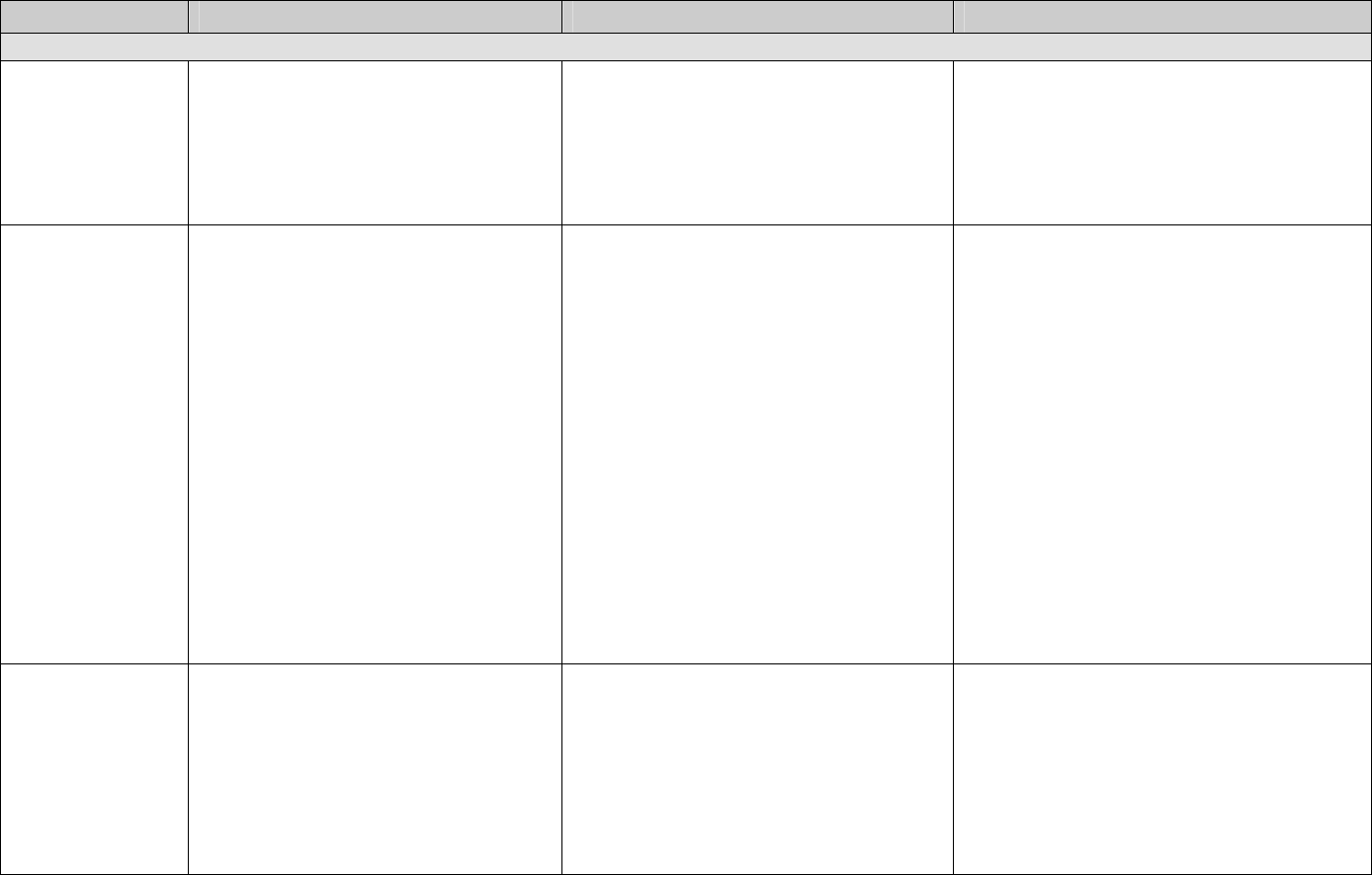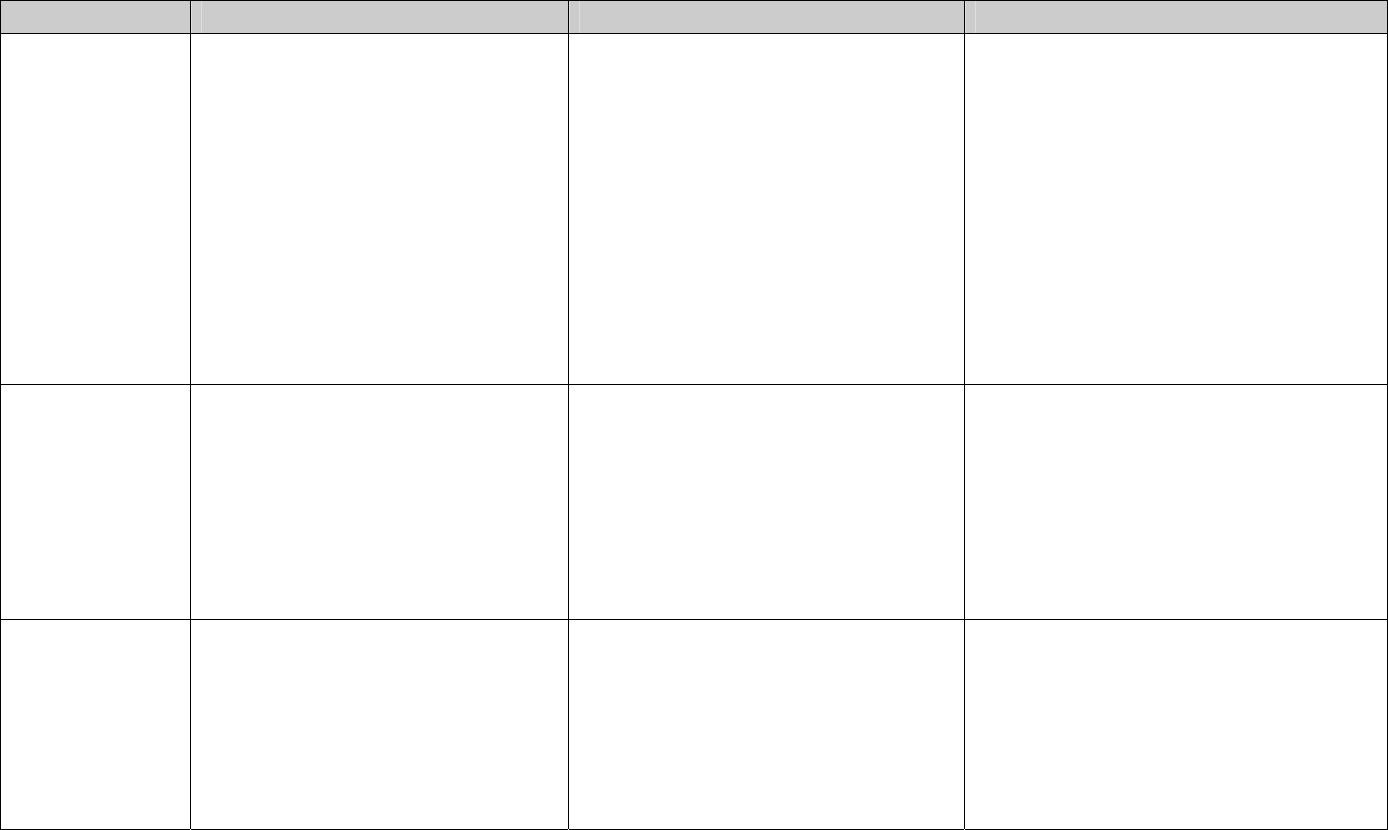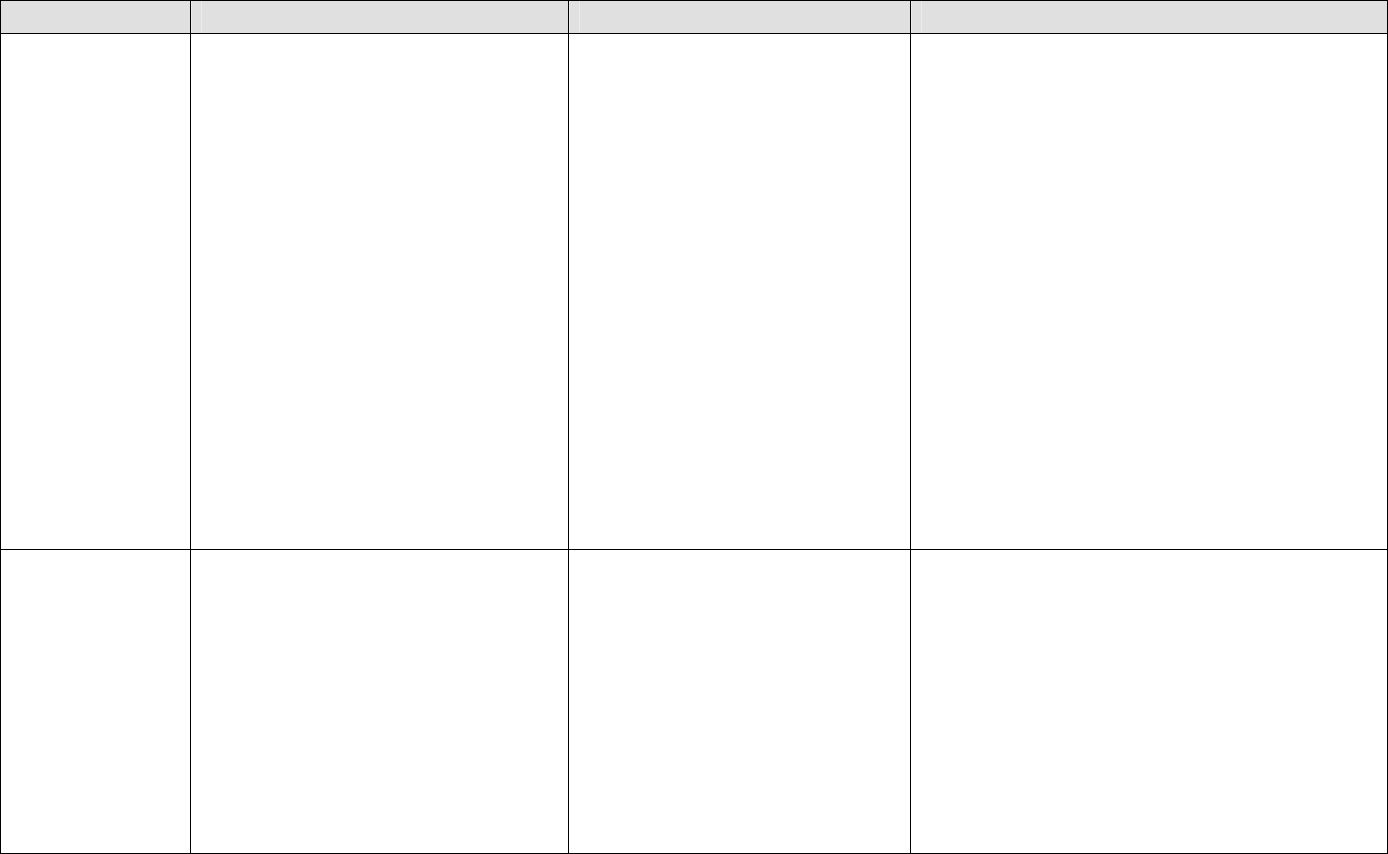
Wallingford Public Schools
French Scope and Sequence
Approved by Board of Education: May 15, 2006
Revisions approved by Board of Education on March 17, 2008
1
STRAND EXPLORATORY FRENCH I FRENCH II
COMMUNICATION
SPEAKING
• Practice and give the meaning of a
basic French vocabulary
– Words
– Phrases
• Recognize the meaning of French
vocabulary relating to everyday life.
• Speak in simple sentences.
• Ask and respond to questions.
• Conduct a simple dialogue.
• Practice and give meaning to French
vocabulary relating to specifics of
everyday life.
• Share information about themselves in
French.
• Engage in simple conversations in
French.
LISTENING
• Recognize the difference in sounds
between English and French
• Explain in English something heard in
French (simple sentences, present
tense etc.).
• Identify the main ideas, themes, and
some details from authentic media or
live presentations.
• Apply a variety of strategies for
comprehension such as:
- Listening for the general idea
- Listening for recognizable
words
- Asking a question to clarify
meaning
- Interpreting context to infer
meaning
- Watching for facial expressions
and gestures
• Maximize use of the French language
on a daily basis.
• Understand spoken French.
• Explain in English something heard in
French.
• Simple sentences
• Present and past tense
• Explain the main ideas, themes, and
some details from authentic media or live
presentations.
• Maximize use of the French language.
• Apply strategies to understand when
listening such as:
- Voice inflection
- Listening for general idea
- Listening for recognizable words
- Ask a question to clarify context
• Watch for facial expressions and
gestures
WRITING
• Write simple sentences following
patterns
• Write sentences to demonstrate
effective communication.
• Construct simple paragraphs to
reinforce concepts.
• Create dialogues using current
vocabulary.
• Compose notes or short letters in the
target language to peers.
• Write dialogue and two-paragraph
passages on a regular basis.
• Correspond with each other in French.
• Utilize their knowledge of the language
to compose authentic writing pieces such
as letters, journal entries, poems etc.

Wallingford Public Schools
h S and Seq
Approved by Board of Education: May 15, 2006
Revisions approved by Board of Education on March 17, 2008
2
Frenc cope uence
STRAND EXPLORATORY FRENCH I FRENCH II
STRUCTURE
• Connect new French vocabulary to
words they already know in their
native language
• Distinguish and use nouns and
adjectives for agreement
- Gender
- Number
- Recognize functional sight
vocabulary
• Use regular and irregular verbs in the
present and past (passé composé)
tenses.
• Analyze nouns and adjectives for
agreement (gender and number).
• Compare sentence structure between
French and English.
- Question formation
- Noun and adjective placement
- Connection between verbs
and subject pronouns
- Formal and informal subject
pronouns
• Recognize and use vocabulary words
that relate to everyday life.
• Use regular, irregular, and reflexive
verbs:
- Simple past tense
- Present tense
• Use commands:
- Informal
- Formal
• Form more complex sentences.
• Recognize and use at least 400
vocabulary words that relate to everyday
life.
READING AND
LITERATURE
• Read simple books (that follow
patterns) written in French
• Translate simple paragraphs and
dialogue.
• Comprehend simple advertisements,
product labels etc.
• Use reading strategies to figure out
unknown words such as rereading,
sounding out, reading on, finding
known parts within a word etc.
• Analyze excerpts from popular magazine
articles in French (e.g., Bonjour)
• Use strategies to read short stories:
- Context clues
- Identify key words and phrases
- Rereading
- Sounding out
• Use information from the text to make a
prediction.
CULTURE
• Compare and contrast elements of
French culture with native culture
– Gesture and oral expressions of
greeting
– Music
– Food
• Discuss why one would study
another language
• Compare and contrast personal
everyday life with life in French
speaking countries.
• Demonstrate on a map which areas of
the world speak French.
• Discuss general rules of behavior of
French speaking people.
• Analyze ideas and perspectives of at
least two French-speaking cultures or
countries.
- Music
- Food
- Everyday life
- History
- Geography

Wallingford Public Schools
French Scope and Sequence
Approved by Board of Education: May 15, 2006
Revisions approved by Board of Education on March 17, 2008
3
STRAND FRENCH III FRENCH IV AP FRENCH V
COMMUNICATION
SPEAKING
• Discuss their personal feelings and ideas
in French.
• Use strategies to communicate:
- Rephrase
- Say things that are directly related
• Participate in situations in which they will
spontaneously initiate and carry on a
conversation in French.
• Give oral presentations in French.
• Exchange opinions on a variety of
topics including issues that are of
contemporary or historical interest.
• Hold conversations with peers and
French-speaking people whenever
possible.
• Make a formal presentation to the
class on a research topic in French.
• Express facts, ideas and feelings in understandable
French using appropriate grammar and pronunciation.
• Demonstrate effective interrogative communication.
• Participate in student generated dialogues.
• Deliver formal and informal presentations.
• Analyze works in a variety of formats including movies,
poetry, journalistic samples and peer presentations.
• Use French almost exclusively in the classroom.
• Engage in informal conversation in the target
language.
LISTENING
• Listen with understanding to a variety of
speakers.
• Apply a variety of strategies to
understand when listening such as:
- Voice inflection
- Listening for general idea
- Listening for recognizable words
- Ask a question to clarify context
- Watch for facial expressions and
gestures
• Explain in English something heard in
French.
• Simple sentences
• Present and past tense
• Maximize use of the French language.
• Explain the main ideas, themes, and
some details from authentic media or
live presentations such as:
- Video segments
- Commercials
- Music
• Listen with understanding to a
variety of speakers.
• Apply a variety of strategies to
understand when listening such as:
- Voice inflection
- Listening for general idea
- Listening for recognizable
words
- Ask a question to clarify
context
- Watch for facial expressions
and gestures
• Explain the main ideas, themes,
and some details from authentic
media or live presentations such
as:
- Video segments
- Commercials
- Music
• Maximize use of the French
language.
• Develop the ability to comprehend formal and
informal spoken French effectively.
• Apply a variety of strategies to understand when
listening such as listening for general idea and
recognizable words, asking a question to clarify
meaning and interpreting context to infer meaning
(inflection, facial expression, gestures etc.)
• Demonstrate active listening by explaining the main
ideas, themes and some details from authentic
media.

Wallingford Public Schools
French Scope and Sequence
Approved by Board of Education: May 15, 2006
Revisions approved by Board of Education on March 17, 2008
4
STRAND FRENCH III FRENCH IV AP French V
WRITING
• Compose dialogue and paragraph
passages in French.
• Create authentic writing pieces such as
letters, journal entries, poems, short
stories etc. in French.
• Correspond with each other in French.
• Write a short research report in French.
- Include information from sources
- Analyze and express personal
opinions
• Analyze writing and set personal goals
for:
- Verb tense
- Sentence structure
- Spelling
- Organization of ideas
• Write formal and informal
compositions on a variety of topics.
• Create authentic writing pieces
such as letters, journal entries,
poems, short stories etc. in French.
• Write reports in French.
• Analyze writing and set personal
goals for:
- Complex sentences
- Variety and use of tenses
- Accuracy and specificity of
word choice
• Write formal and informal compositions on a variety of
topics.
• Create authentic writing pieces such as letters,
journal entries, poems, short stories, exlications de
texte, resumes etc. in French.
• Analyze writing for correct grammar as well as
accurate and appropriate word use.
• Generate a 1500-word (5 page) paper aligned with
MLA guidelines.
• Develop a portfolio of writing samples (minimum of 1
per month).
• Research topics through traditional and technological
means.
STRUCTURE
• Apply grammatical structure in regular
and irregular forms to:
- Future
- Conditional
- Present subjunctive mood
• Utilize at least 600 vocabulary words.
• Compare sentence structure between
French and English.
• Form complex sentences.
• Apply grammatical structure in
regular and irregular forms to:
- Subjunctive (present and past)
- Compound tenses
• Recognize and use at least 800
vocabulary words.
• Compare sentence structure
between French and English.
• Form complex sentences.
• Use appropriate advanced grammatical structures.
• Use previously acquired vocabulary to understand
literature, magazines and newspapers, class
discussions and selected movies.
• Use knowledge of parts of speech to improve
effective dictionary use.
• Integrate the four language skills through the use of
authentic materials.

Wallingford Public Schools
French Scope and Sequence
Approved by Board of Education: May 15, 2006
Revisions approved by Board of Education on March 17, 2008
5
STRAND FRENCH III FRENCH IV AP French V
READING AND
LITERATURE
• Read realia.
• Interpret the main idea and relevant
details.
• Use information from the text to
make a prediction.
• Utilize strategies to read short
stories:
- Context clues
- Rereading
- Sounding out
• Develop strategies to read
authentic literary text using
previous knowledge (e.g.,
poems, plays, short stories,
excerpts from novels)
- Context clues
- Rereading
- Sounding out
• Share personal reactions to and
feelings about authentic literary
texts
• Use information from the text to
make predictions.
• Interpret main ideas and
relevant details.
• Evaluate literature written in
French to describe the
perspective of the author
• Respond to questions that elicit
higher level thinking skills
• Build their personal vocabulary
bank
• Develop strategies to read authentic literary
texts using context clues, previous knowledge
and rereading.
• Interpret main ideas and relevant details from
authentic literary texts.
• Respond to questions which elicit higher level
thinking skills.
• Share personal reactions to and feelings about
authentic literary texts.
• Build vocabulary and knowledge through
authentic readings.
• Demonstrate integration of four language skills
through literature-based activities.
CULTURE
• Research and analyze aspects and
perspectives of various French
speaking cultures.
- Art
- Music
- Fashion
- Cuisine
- History
- Geography
• Present researched information on
French cultures in French.
• Research and analyze aspects
of francophone cultures
- Art
- Music
- Dance
- History
- Geography
• Present researched information
in French
• Examine literature written by
French authors for historical
and cultural references
• Research and analyze aspects of francophone
culture.
• Examine francophone literature for historical
and cultural references.
• Integrate the four language skills through
culturally-based activities.
• Compare and contrast the cultures of different
French-speaking countries through authentic
readings, music, television, and movies.
